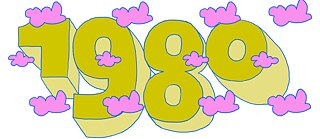The song “Der Goldene Reiter” (1980) by Joachim Witt can be categorized in the "Neue Deutsche Welle" genre (New German Wave; NDW). Everything under that brand umbrella today needs to be considered in a differentiated way. Having originally started as a newcomer grass-roots movement based on the DIY idea of punk, the term’s scope of reference has broadened over time.
Tonspuren
With eight German-language songs from eight decades, music journalist Mario Lasar sheds some light on important cultural and social phenomena in (West) German post-war history.
Most of the songs and artists mentioned in this series can be listened to (in order of mention) in a Spotify playlist: open.spotify.com/playlist/soundtracksBRD/
Nevertheless, even Hubert Kah, who is considered an upstart and fake from a dogmatic point of view, still has an inherent glamour that sets him apart from the banal and over-egged Schlager stars of the 70s. Kah represents the commercial side of the NDW, and yet the fact that he appears on the ZDF hit parade - the venue for bourgeoisie turned music - in a nightgown, – represents an outrageous and refreshing break with conventions for me as an 11-year-old at the time. In addition, he plays music that sounds new and fresh – and breaks free from the dictates of the "Schunkel" rhythm.
In fact, a unique position within German music history can be attributed to the NDW. Never before or since has it been possible to be so successful with rule-breaking of a musical or performative nature. The NDW managed to create an intersection between conspicuous behavior and commercial entertainment.
At the height of the NDW, Joachim Witt – who was born in 1949 – is navigating an area of conflict between pioneering spirit and opportunism. Witt started out as a guitarist with the German rock band Duesenberg, which is a long way from breaking down musical boundaries. When Witt confronts fellow band members with the song he has written entitled Der Goldene Reiter, they dismiss it as ridiculous. Although the musician is already in his early thirties by 1980, and therefore around ten years older than the original NDW proponents, he does appear to be a man of conviction. He sets out to find himself a record contract as a solo artist.
Following the initial flop of the album Silberblick, released at the end of 1980, this changed abruptly when Witt appeared in the television show Musikladen in November 1981. This gig can be considered a significant event in the history of German television. On this occasion, Witt performs Der Goldene Reiter in a method-acting style. He uses sweeping, angular gestures and manically distorted facial expressions to present an impressive visualization of the lyrics, which take the perspective of a psychiatric patient. The way the singer projects himself into the role of the mentally ill man seems so authentic that many viewers believe that Witt actually is “the golden horseman”.
Within a short time, both song and performance become such a topic of conversation that Der Goldene Reiter gets into the charts the following week, reaching number 2 as its highest position. The single sells about 250,000 copies in total, the album Silberblick about 300,000. The effect that a one-off television appearance in the early 80s could still produce is illustrated here.
If you want to distinguish between underground and overground at all regarding NDW, Der Goldene Reiter is the highlight in the latter segment. Musically speaking the track, with its monotone beat and edgy guitar backing, is Witt’s individual variation on a typical NDW formal idiom. The music forces itself to be reduced, touches on dissonance at most instead of exhibiting it. As a result, the song meets the criteria of a commercial hit. In the leading music magazine of the time, Sounds, music journalist Xao Seffcheque speaks contemptuously of the new “Intercity Dining Car Music” – a modification of the old term "elevator music" adapted to the new era.
The song undeniably has a certain streamlined character, of course. But especially in combination with Witt's pretentious vocals and the innovative lyrics, it does go right out on a limb. Witt uses words that have never cropped up in pop songs before. “Fassungsvermögen” (capacity), “Behandlungszentren” (treatment centers) or “Umgehungsstraße” (bypass) are extremely technical, cold terms that fit perfectly into the time of the early 80s.
With the help of an almost architectural language, Witt creates an ambience that implements a cheery version of the paranoia that was widespread at the time – in view of Orwell’s impending 1984. Der Goldene Reiter realigns the old feel-good inwardness of the 70s to create a sense of unease. The fact that the song became a hit shows the extent to which people were willing to engage with content and topics that were previously considered taboo. Der Goldene Reiter is representative of a brief period in which reality appeared to consist of concrete and neon light.
Soundtracks
- 1950s: Just don’t overdo it with the freedom! (Fred Bertelmann – "Der lachende Vagabund")
- 1960s: A poetic moral portrait of class society (Franz Josef Degenhardt – "Spiel nicht mit den Schmuddelkindern")
- 1970s: An unusual alliance between green politics and Schlager hits (Udo Jürgens – "Tausend Jahre sind ein Tag")
- 1980s: Concrete and neon lights (Joachim Witt – "Der Goldene Reiter")
- 1990s: Of new possibilities (Blumfeld – "Tausend Tränen Tief")
- 2000s: When things are worth more than people (Die Goldenen Zitronen – „Wenn ich ein Turnschuh wär“)
- 2010s: Great cinema? (Helene Fischer – "Atemlos durch die Nacht")
- 2020s: A new power structure of gender roles (Christin Nichols – "Bodycount")
The publication of this article is part of PERSPECTIVES - the new label for independent, constructive, multi-perspective journalism. >>> To know more about PERSPECTIVES
05/2024
